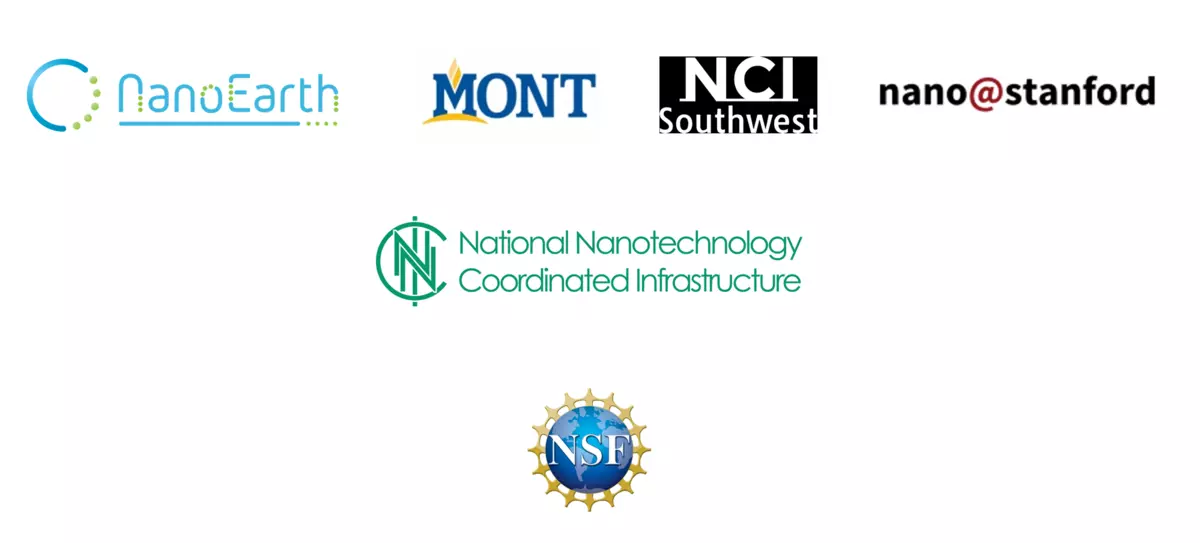NNCI Nanoscience in the Earth and Environmental Sciences Research Community Virtual Workshop
May 16-17, 2022, with optional 'Office Hours with Experts' on May 18
Days begin at: 11 am Eastern (Duration: ~4.5 hours each day)
Hosted by NanoEarth (The Virginia Tech National Center for Earth and Environmental Nanotechnology Infrastructure) in coordination with MONT, NCI-SW, and nano@stanford.
This workshop has already taken place.
Workshop Overview
Nanoscience is the study of natural and artificial materials at extremely small scales where novel properties emerge. In addition to creating faster and more powerful computers, new discoveries in nanoscience research are enabling technologies that are critical to solving issues related to energy, climate, human health, and more. However, researchers in the Earth, environmental, agriculture, and water sciences, as well as related fields tend to be underrepresented in nanoscience and nanotechnology. Increased participation would lead to new solutions to important societal problems related to more sustainable food production, clean soil and water, energy production and storage, and climate change, as well as deeper understanding of Earth and planetary processes and environmental systems.

This workshop will demonstrate the practical aspects of applying the tools and knowledge of nanoscience to study planetary and environmental samples. Specifically, the focus will be on using electron imaging, spectroscopy, and x-ray diffraction methods to study natural materials at the nanoscale. The workshop content will be presented as two case studies: 1) nanoparticles in sediments collected from an active drinking water reservoir, and 2) nanoscale structures in a meteorite sample. Topics to be covered include sample collection in the field, sample preparation/preservation, and instrumental data acquisition, reduction, and representation. The workshop will include presentations and demonstrations with ample time for Q&A to explore modern advances of nanoscience as applied to the Earth and environmental sciences. This is an invitation to all scientists to learn more about the emerging research opportunities afforded by nanoscience and to identify the needs of conducting nanoscience in geosciences, environmental sciences, agriculture, water science, and related fields.
Workshop Goals
- The goal of Day 1 is to introduce the audience to environmental nanoscience research using a case study that will be explored through a series of demonstrations (synchronous and asynchronous videos), discussions with live polls, and Q&A sessions. There will be an emphasis on sampling from environmental systems and the advantage of integrating data from multiple characterization methods including powder x-ray diffraction (XRD), and scanning and transmission electron microscopy methods (SEM and TEM).
- The goal of Day 2 is to introduce the participants to an example of using a nanoscience approach to understand a solid Earth material. The case study will explore a meteorite sample prepared in the form of a thin section using a combination of SEM-FIB (focused ion beam), TEM, and electron probe micro-analysis (EPMA).
- The optional 'Office Hours with Experts' sessions on Day 3 will allow participants to sign up for 10 minute sessions with experts in topics of interest. Participants will be able to talk directly about their research interests and to solicit advice and feedback.
Who Should Attend
This workshop is geared towards nano-novices. We welcome all colleagues who are nano-curious, such as:
- Researchers who would like to share their methods and results and obtain community feedback
- Researchers in Earth, environmental, agricultural, water, geoscience, or related fields who would like to learn more about nanoscience and how it can advance their research
- Researchers who are looking to join information networks, initiate collaborative research or gain access to nanoscience facilities
- Faculty, graduate students, post-docs, industry, and government-based professionals with a broad interest in nanoscience
Workshop Program and Format
This workshop will take place online, primarily through Zoom, and include a series of invited short talks and small panels to investigate the many dimensions of nanoscience in the Earth and environmental sciences. The workshop will be as interactive as possible in a virtual format. Participants will have access to our growing online resources on nanoscience in the Earth and environmental sciences; will have the opportunity to contribute ideas and resources to the workshop program and related collections; and will be encouraged to participate in continuing networked user groups to further develop nanoscience resources for use by the community. An introduction to nanoscience can be accessed at Teaching Nanoscience Across the Undergraduate STEM Curriculum.
Invited Speaker: Prof. Susan L. Brantley, Penn State University
Susan L. Brantley, Barnes Professor of Geosciences, investigates chemical, biological, and physical processes associated with the circulation of aqueous fluids in shallow hydrogeologic settings. She is particularly interested in the critical zone – the zone from the top of vegetation canopy to groundwater. Her investigations incorporate field and laboratory work as well as theoretical modeling of observations. Of particular interest to her studies are questions concerning the measurement and prediction of the rates of natural processes, including chemical weathering with and without micro-organisms. Her recent work has focused on the effect of microbial life on mineral reactivity in addition to measuring and modeling how rock turns into regolith.
Workshop Expectations
By registering for the workshop, participants agree to do the following:
- Participate fully in the entire workshop and attend all workshop sessions during Days 1 and 2
- Review and follow SERC's Code of Professional Conduct
Registration
Participation in the workshop is free, but pre-registration is required to facilitate planning for the workshop and for reporting requirements.
This workshop has already taken place.

![[reuse info]](/images/information_16.png)


